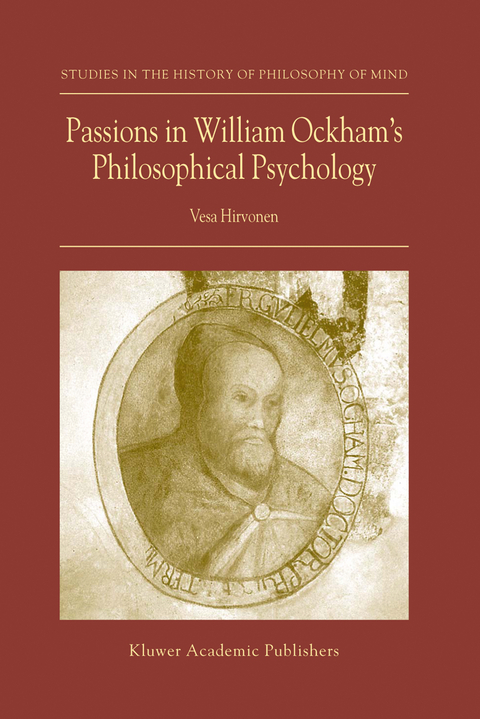
Passions in William Ockham’s Philosophical Psychology
Seiten
2004
Springer-Verlag New York Inc.
978-1-4020-2118-3 (ISBN)
Springer-Verlag New York Inc.
978-1-4020-2118-3 (ISBN)
Providing an analysis of passions or emotions in William Ockham's psychology, this study shows how Ockham diverged from the traditional opinion of emotions in arguing that there were emotions in the will, not only in the lower part of the soul. It discusses Ockham's approach to the traditional distinctions between amicable love and wanting love.
1. 1. INTRODUCTORY REMARKS At the end ofthe 19th century, when the discipline called psychology 1 is said to have become "independent" , attention began to be focused towards nominalistic philosophy from a point of view that can be called psychological. At that time, Vienna, the capital of the Austro- Hungarian Dual Monarchy, was a center for several disciplines. It is no wonder that it was there that the research conceming the psychological themes of William Ockham and other nominalists began. Karl Wemer (1821-1888), a Catholic, neo-scholastic scholar, professor of New Testament studies at the Univers?ty of Vienna (1870), and a member ofthe Imperial Academy of Sciences (1874), seems to have planned a history of medieval psychology. However, only fragments of it were printed, among them the following articles: 'Der A verroismus in der christlich-peripatetischen Psychologie des sp?teren Mittelalters' (1881), 'Die nominalisirende Psychologie der Scholastik des sp?teren Mittelalters' (1881) and 'Die augustinische Psychologie in ihrer mittelalterlich-scholastischen Einkleidung und Gestaltung' (1882). 2 Wemer deals especially with Ockham's 1 See Kusch 1995 and 1999. 2 Pluta 1987, 12-13.
See Wemer 1881a, 1881b, 1882. (Those three texts were republished in 1964 under the name Psychologie des Mittelalters. ) Prior to those books, Wemer had written about William of Auvergne's, Bonaventure's, John Duns Scotus's and Roger 1 2 CHAPTERONE psychology, among other things, in the second of these articles.
1. 1. INTRODUCTORY REMARKS At the end ofthe 19th century, when the discipline called psychology 1 is said to have become "independent" , attention began to be focused towards nominalistic philosophy from a point of view that can be called psychological. At that time, Vienna, the capital of the Austro- Hungarian Dual Monarchy, was a center for several disciplines. It is no wonder that it was there that the research conceming the psychological themes of William Ockham and other nominalists began. Karl Wemer (1821-1888), a Catholic, neo-scholastic scholar, professor of New Testament studies at the Univers?ty of Vienna (1870), and a member ofthe Imperial Academy of Sciences (1874), seems to have planned a history of medieval psychology. However, only fragments of it were printed, among them the following articles: 'Der A verroismus in der christlich-peripatetischen Psychologie des sp?teren Mittelalters' (1881), 'Die nominalisirende Psychologie der Scholastik des sp?teren Mittelalters' (1881) and 'Die augustinische Psychologie in ihrer mittelalterlich-scholastischen Einkleidung und Gestaltung' (1882). 2 Wemer deals especially with Ockham's 1 See Kusch 1995 and 1999. 2 Pluta 1987, 12-13.
See Wemer 1881a, 1881b, 1882. (Those three texts were republished in 1964 under the name Psychologie des Mittelalters. ) Prior to those books, Wemer had written about William of Auvergne's, Bonaventure's, John Duns Scotus's and Roger 1 2 CHAPTERONE psychology, among other things, in the second of these articles.
1. Introduction.- 1.1. Introductory Remarks.- 1.2. Terms and Things.- 2. The Passionate Human Being.- 2.1. The Human Being.- 2.2. Passions of the Souls.- 3. Sensory Passions.- 3.1. Genesis of the Sensory Passions.- 3.2. What Are Sensory Passions?.- 4. Passions of the Will.- 4.1. Genesis of the Passions of the Will.- 4.2. What Are Passions of the Will?.- Conclusion.- Name Index.
| Erscheint lt. Verlag | 31.5.2004 |
|---|---|
| Reihe/Serie | Studies in the History of Philosophy of Mind ; 2 |
| Zusatzinfo | 2 Illustrations, black and white; IX, 213 p. 2 illus. |
| Verlagsort | New York, NY |
| Sprache | englisch |
| Maße | 155 x 235 mm |
| Themenwelt | Geisteswissenschaften ► Philosophie ► Geschichte der Philosophie |
| Geisteswissenschaften ► Philosophie ► Philosophie des Mittelalters | |
| Geisteswissenschaften ► Philosophie ► Philosophie der Neuzeit | |
| Geisteswissenschaften ► Religion / Theologie | |
| ISBN-10 | 1-4020-2118-6 / 1402021186 |
| ISBN-13 | 978-1-4020-2118-3 / 9781402021183 |
| Zustand | Neuware |
| Haben Sie eine Frage zum Produkt? |
Mehr entdecken
aus dem Bereich
aus dem Bereich
die kolonialen Wurzeln der französischen Theorie
Buch | Hardcover (2024)
Matthes & Seitz Berlin (Verlag)
28,00 €
oder Das Leben Montaignes in einer Frage und zwanzig Antworten
Buch | Softcover (2023)
C.H.Beck (Verlag)
18,00 €
Auf dem Weg zu einer Kultur der Bewusstheit | Mit mehr als 500 …
Buch | Hardcover (2023)
Berlin Verlag
48,00 €


